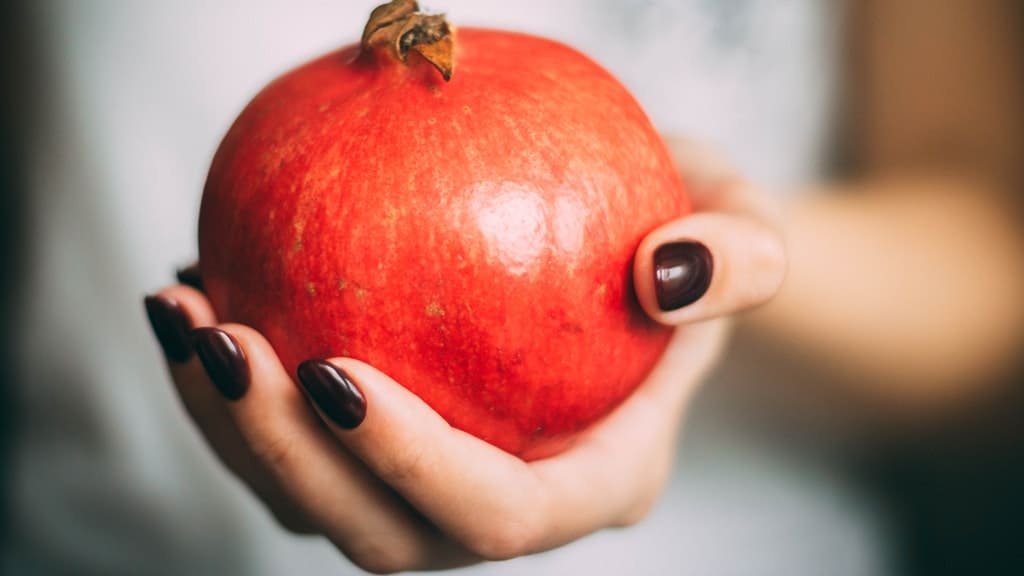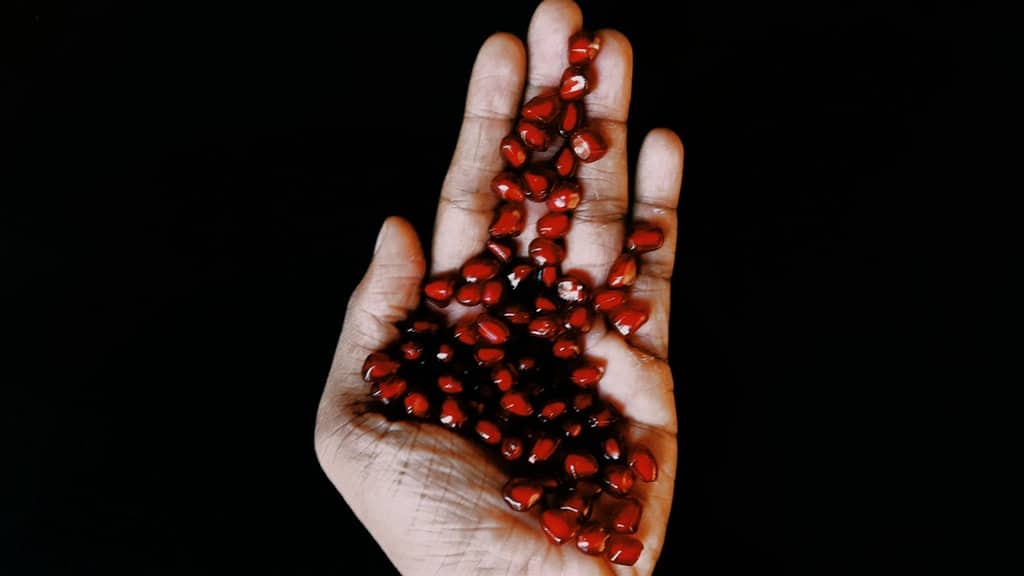Pomegranates are fruit categorized as a berry. Each piece of this fruit has a diameter of about 2-5 inches, is round and red, and has a flower-shaped stem. The skin is inedible and challenging to get through, but the seeds inside of the fruit are entirely edible and contain a large portion of the benefits.
Pomegranate is not only a delicious fruit, but it is also a fruit full of health benefits that have been backed by doctors. Even the pomegranate juice is full of the benefits, in some cases, in more significant amounts than in the whole fruit itself.
While the proven benefits of pomegranates are plentiful, many don’t realize just how many there are. It is truly an under-rated fruit and should gain much more recognition than it currently receives.
12 Proven Benefits of Pomegranate
1. This fruit contains many essential nutrients.
One cup contains the following nutrients:
- 7 grams of fiber
- 3 grams of protein
- 30% of the daily recommended amount of Vitamin C
- 36% of the daily recommended value of Vitamin K
- 16% of the daily recommended amount of folate
- 12% of the daily recommended amount of potassium
2. Pomegranates encourage an anti-inflammatory response in the body.
Chronic inflammation can lead to many severe diseases, including heart disease, cancer, diabetes (type 2), Alzheimer’s disease, obesity, and many other conditions. Pomegranates have a high anti-inflammatory property. Research shows the capabilities of this fruit to reduce inflammation in the body far exceeds many other anti-inflammatory remedies.
3. They may help prevent or reduce the risk of cancer.
Incorporating pomegranates into your diet could reduce significantly the risk of colon cancer, breast cancer, and prostate cancer. The growth of cancer cells can be slowed down considerably by regularly consuming pomegranate juice. This happens because of the anti-inflammatory and anti-angiogenic properties of the fruit, which prevents cancer cells or tumors from finding a blood supply.
4. The fruit can help normalize blood pressure.
LDL oxidation leads to a build-up of plaque in your body, and this fruit reduces the LDL oxidation. It prevents plaque from building up, and it also helps clear away plaque that has already started to form.
5. Pomegranates can help treat arthritis or other joint pain.
This treatment is mostly due to the anti-inflammatory properties found in the fruit. Arthritis and joint pain can be debilitating if it gets bad enough, and pomegranates have been found to relieve the pain caused by inflammation rather quickly. There are fewer incidences of pain reported by those who consume the fruit regularly, as well.
It is essential to mention that the fruit also blocks damaging enzymes from reaching the joints, preventing and slowing the onset of osteoarthritis.
6. It can reduce your risk of developing heart disease.
Cardiovascular health is improved when pomegranates are regularly incorporated in the diet. By regulating blood pressure, reducing and preventing plaque buildup, and the other health benefits of pomegranate, the risk of developing heart disease (the number one killer in the United States) significantly lessens.
7. They serve as a natural treatment for erectile dysfunction.
Since this fruit encourages blood flow throughout the body and erectile dysfunction is mostly caused by oxidative damage (which is what poor blood flow creates), it only makes sense that pomegranates can treat the issue. Studies suggest that regularly consuming pomegranates in some form treated ED.
8. Bacterial and fungal infections can be treated or prevented by consuming pomegranates.
Consuming pomegranates regularly can help treat both bacterial, fungal, and viral infections. This fruit can stimulate the natural probiotics in the body, which work to fight and prevent infections. Furthermore, pomegranates work extra hard to fight against yeast present in the body.
This applies to oral health as well, as consuming pomegranates can prevent and treat gingivitis and periodontitis.
9. It can improve memory.
The seeds from pomegranates contain large amounts of polyphenols, which have been proven to help retain memory. Further studies have shown that it helps the elderly who have memory problems, and it can slow down the onset of Alzheimer’s.
10. Consuming pomegranates can lead to improved exercise sessions.
Dietary nitrates are necessary for efficient exercise performance, and pomegranates contain high amounts of them. Studies show that consuming the fruit about 30 minutes before exercise improves performance significantly.
11. The pomegranate juice contains antioxidants.
Found in the pomegranate juice, punicalagin is a potent antioxidant that has nearly three times the amount of antioxidants found in red wine, green tea, and many other popular sources of antioxidants.
12. It helps cure anemia.
Pomegranates contain quite a large amount of iron, reversing anemia and preventing it in the future. It also helps encourage blood flow through the body, which also helps with anemia.
How to Easily Include Pomegranate in Your Diet
While recipes that include this fruit may not be well known, there are many out there. If you can’t find a recipe you’re interested in or want a quick way to eat them without cooking or preparing, there are options for that, too.
Some of the best and easiest ways to incorporate pomegranates into your diet include:
Drink it
Pomegranate juice is one of the best ways to enjoy all of the benefits this fruit has to offer. You can buy it pre-bottled, but it is essential to make sure that the contents are pure pomegranate with no added sugars or additives.
If you’d rather play it safe, you can make your pomegranate juice by putting all of the seeds into a juicer or food processor. Once you’ve done this, you may want to strain the seeds from the liquid before drinking it.
Another way to drink the juice is to add it to a smoothie. It doesn’t matter which smoothie recipe you use. You can throw a handful of seeds into whichever one you choose.
Put it in a salad
For a splash of sweet flavor in your salad, you can throw in some seeds or make a vinaigrette from the juice. You can do this to a typical salad, or you can enhance a more flavorful salad.
Make it into a dessert
Some popular options include making it into a creamy yogurt or sorbet. You could also add them into a pie or cobbler, or bake them into cookies and cake. The options are limitless, as they can be added to nearly any dessert.
Eat them alone
The seeds make a delicious snack all on their own. Low in calories and packed full of nutrients, a handful of the seeds can give you all of the benefits you need while also holding you over until lunch or dinner.
 How to Easily Peel a Pomegranate
How to Easily Peel a Pomegranate
Maybe the reason that pomegranates are so under-rated is because of the thick skin that is hard to penetrate. Many find it to be a struggle to get to the delicious pomegranate juice and seeds, but once it is figured out, the fruit will quickly become a favorite.
Step one:
Wear clothing you don’t mind getting stains on or put on an apron. Line your work surface with a paper towel, as well. This fruit is messy and stains, so taking the proper precautions is necessary.
Step two:
Remove the top and bottom of the fruit using a sharp knife. A dull blade will not cut through the skin, and even if it does, it could easily slip and cut you. The sharp blade is the safest, most effective option.
Step three:
Make four incisions on the fruit from top to bottom, cutting only through the skin and stopping when you’ve reached the fruit. These incisions should be equally spaced, making four equal sections.
Step four:
Get a large bowl and fill it with frigid water. Put the fruit in the cold water and break it into four sections, using the cuts made before.
With the fruit still in the water, pull the seeds from the skin. The seeds will sink to the bottom of the bowl while the other pieces will float. This makes it easy to separate the edible parts from the inedible.
Remove the inedible parts and then strain the water from the seeds. You can store the seeds for about three days in a sealed container.
 Final Thoughts On the 12 Proven Benefits of Pomegranate
Final Thoughts On the 12 Proven Benefits of Pomegranate
Pomegranate has been proven to be one of the healthiest foods on earth. The many nutrients and other benefits make it a fruit that can’t be passed up. If you weren’t a fan before, try some new ways to include pomegranates in your diet so that you can reap the benefits.
Remember, the skin is inedible (as you will quickly find out when you try to peel it), but the seeds and pomegranate juice are entirely edible and delicious. It is well worth the work of getting through the skin.

















